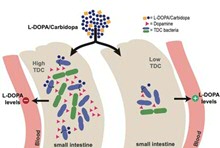Research Highlights
Dr. Sahar El Aidy

Gut bacteria-driven chemical transformation of nutrients and drugs is an emerging field of research that investigates how the microorganisms living in the human gut can modify the chemical structure and activity of food components and medication. One of the breakthroughs in Sahar El Aidy's research involves the identification of a gut bacterial enzyme (tyrosine decarboxylase) that interferes with the bioavailability of levodopa, the gold-standard treatment for Parkinson's disease[1-3]. Such bacterial transformation leads to a decrease in the availability of levodopa in the bloodstream and, consequently, in the brain. This necessitates patients to receive more frequent administrations of levodopa, which, in turn, exacerbates the side effects of the treatment. These findings have led to precompetitive research projects with drug-development companies with the goal of gaining new insights that can be translated towards the further development of applications or products.
[1] van Kessel SP, Frye AK, El-Gendy AO, Castejon M, Keshavarzian A, van Dijk G & El Aidy S (2019) Gut bacterial tyrosine decarboxylases restrict levels of levodopa in the treatment of Parkinson's disease. Nature Communications 10(1): 310; DOI: 10.1038/s41467-019-08294-y.
[2] van Kessel SP, Auvinen P, Scheperjans F & El Aidy S (2021) Gut bacterial tyrosine decarboxylase associates with clinical variables in a longitudinal cohort study of Parkinsons disease. Parkinson’s Disease 7(1): 115; DOI: doi: 10.1038/s41531-021-00260-0.
[3] van Kessel SP, Bullock A, van Dijk G & El Aidy S (2022) Parkinson's disease medication alters small intestinal motility and microbiota composition in healthy rats. mSystems 7(1):e0119121; DOI: 10.1128/msystems.01191-21.
| Last modified: | 26 October 2023 2.03 p.m. |
